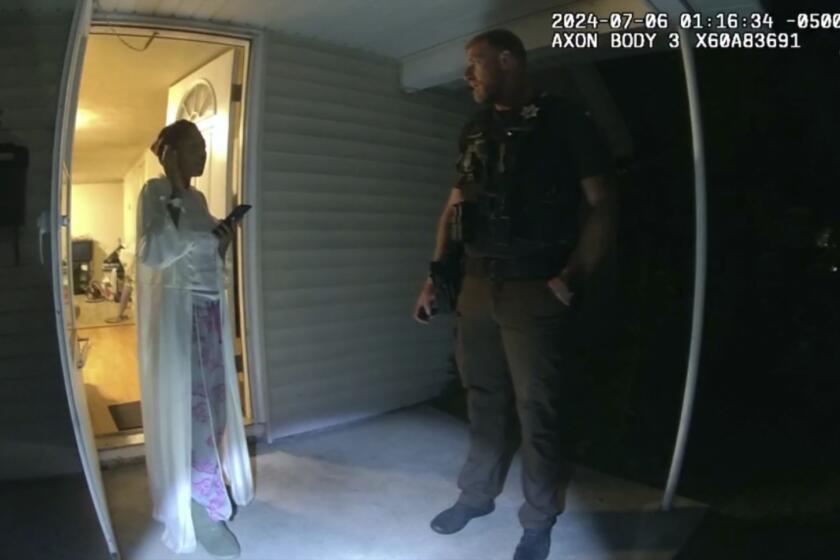In the Wonderland of Libraries Are Cats Like Alis
There were quiet moments in the Silverado Branch Library when the world seemed still, and words moved silently from the page, like sunlight through a window, and the only sound was the faint purr of a calico cat. Her name was Alis.
Little is known about her life before she arrived at the tiny library, located at the base of the Santa Ana Mountains in Orange County. She came to Silverado Canyon as a kitten in 1985, on a day when branch librarian Lucille Cruz was waiting--and waiting--for the newly created Automated Library Information System (ALIS) to recover from a crash.
As they waited, Cruz decided to send an assistant, who had been lobbying for a library cat, to a shelter in search of prospects. The assistant returned with the calico, and to reflect their hope that both cat and computer would work out, they assigned them the same name.
There are many cats, like Alis, living in libraries, stretched across warm computer terminals like vamps on gleaming pianos, or snuggled between volumes by Steinbeck and Stegner. There is a Web site, a documentary and even an organization, the Library Cat Society, based in Moorhead, Minn., that produces a newsletter to a nationwide membership.
It’s not always smooth going, depending on the demeanors of cats and customers, but from the moment Alis arrived at the Silverado Canyon library, patrons welcomed her. They visited even when they had no literary needs. When they moved away, they sent her cards, and she wrote back, a paw-shaped stamp serving as her signature. Friends brought tasty treats on special occasions, played with her, listened for her soothing purr on still days. Young people in the canyon grew up with Alis, listened to glorious tales with her during the story hours of their childhoods. She made the library feel like home, says Cruz.
Even Carmen Franklin, a local woman whose affections included spy thrillers and historic romance but not cats, eventually came around to accepting Alis, who would hop up on the counter and rub against her, as if to say, “How could you not love me?”
Eventually Carmen, albeit with some hesitation, reached out, petted Alis a bit awkwardly and acknowledged, “I guess she’s all right for a cat.”
Both are gone--Carmen, who died in December, and Alis, who died last month--but even now, says Cruz, lifting her eyes and smiling, “Alis is probably up there buggin’ her.”
By all accounts, Alis was a friendly and courageous cat.
She stood her ground against the occasional rodent, reptile or dog intruding upon her domain, but when it came to people, especially the elderly, she extended warm invitation, leaning against ankles in gentle pursuit of soft strokes.
After more than 15 years of library life, Alis died of a stroke on one of the last days of January. She was buried next to a dog named Bear beneath a sapling oak and purple sage.
The relationship between cats and libraries goes back centuries, says Phyllis Lahti, founder and director of the Library Cat Society. It was likely the result of another, less accepted relationship, that of libraries and mice.
The society has a threefold mission: “To encourage the establishment of a cat or cats in a library environment; to improve the well-being and image of the library cat; and to promote camaraderie among library staffs who have cats, or hope to, and with those persons not in libraries who advocate library cats.”
“They’re especially attractive to older people who visit libraries, and they’re amenable to petting,” says Lahti. “Books, cats and libraries go together.”
Some, like Richard Espinosa of San Marcos, would disagree. Espinosa has filed a $1.5-million lawsuit against the Escondido Public Library. In it, he claims a cat named L.C. (Library Cat) attacked his assistance dog, Kimba, who he says is trained to help him deal with, among other things, anxiety attacks.
L.C. has been given a change of venue and now stays with a library employee pending a resolution of the case.
There have been other lawsuits filed on behalf of those who fear cats or are allergic to them and oppose their presence in public places. It has become an emotional issue at some libraries.
In 1997, filmmaker-comedian Gary Roma of Boston produced a documentary about library cats titled “Puss in Books: Adventures of the Library Cat.” It was a departure from his previous work, an examination of doorstops.
While researching the film, Roma heard about a cat named Muffin, who was removed from a library in Putnam Valley, N.Y., when a library trustee developed an allergy to cats. Upon the cat’s eviction, two members of the community became so upset they removed the library from their wills. It was an $80,000 loss in future revenue.
Roma has developed a Web site about library cats at www.ironfrog.com that includes a map listing almost 400 current and past library cats.
In Spencer, Iowa, population 11,300, public library director Vicki Myron says the most famous being to ever call Spencer home might be a cat named Dewey Readmore Books, who has appeared on radio and television as well as in magazines and newspapers.
His story began one morning in the cold of winter. On Jan. 18, 1988, Myron and an assistant heard a tiny sound coming from the library’s drop box, and there, buried beneath volumes of returned books, was a kitten.
“He was half-dead, and his foot pads were frozen,” says Myron. “We gave him a bath to warm him up and found out he adored people. He wasn’t afraid of strangers, so we decided to keep him.”
He has reached such celebrity status that his picture appears on Spencer’s library cards, and now there are even Dewey postcards, which have been requested from as far away as South Africa, Belgium and Holland. Sales of the cards have generated up to $100 a month for the library.
“He pretty much pays his own way,” says Myron.
Dewey climbs ladders, rides on book carts, sleeps in boxes. In the early morning, he stands and raises a paw against a window as if to wave hello to Myron as she approaches the building.
When those who are uncomfortable around cats use the library, Dewey waits it out in Myron’s office.
He’s very sociable, sitting in on meetings in the conference room, greeting people at the front door and moving from lap to lap. There are a couple of exceptions. If Dewey hears the words “brush” or “bath,” he runs and hides. If he sees James Esterly, the local veterinarian, entering the library, he similarly makes a break for it.
He is especially kind to children with special needs, Myron says. He seems to understand them. “There’s one little girl who can’t speak and rarely smiles, but when she sees Dewey, she absolutely beams.”
Dewey is not inclined to pursue mice, and no such expectations are placed upon him. “If a mouse ever came in here,” Myron says, “Dewey wouldn’t know what to do with it.”
Unlike Dewey, Alis’ fame was limited to her small world. In Silverado Canyon, pets are known by name and reputation. The most visible are the dogs, among them Kelsey and Bailey, who hang out at the Silverado Canyon Market next to the library. Bailey’s brother, Buddy, hangs out at the Shady Brook Market, located up the canyon a bit. Then there’s Megs, Jake and Jesse. Odie now lives in Florida, Shelby doesn’t get out much anymore.
There was a dog named Lacey, best known for her ability to smile on command. Whenever a book ordered by Lacey’s owner would arrive at the library, Cruz would write a note, fasten it to Lacey’s collar, and thus provide notification.
There used to be a couple of ne’er-do-wells, pit bulls, who one Saturday in 1998 sneaked around to the back of the library and came in through the backdoor. Cruz heard a commotion and found the dogs savaging Alis. Cruz ran out front to get help. A man came in and fought the dogs off with his fists.
Alis was rushed to a clinic, where she underwent surgery. A portion of her intestines was removed. She also suffered a broken breastbone and numerous lacerations.
Folks from the canyon went in shifts to sit with Alis as she recovered. Judi Davis, owner of the Silverado Canyon Market, set out the Yuban coffee can she uses for donations whenever a local animal gets run over or otherwise requires medical attention.
Current and past library patrons and employees sent money with their get-well cards. In all, checks, bills and loose change totaled about $1,400, enough for the veterinary clinic to call it even.
Some people say Alis was never the same after the attack. She used to love to go out behind the library next to the creek and lie in the morning sun, but these last few years, she wouldn’t go outside unless someone went with her, Cruz says. She became less patient with young children, had difficulty reaching the top shelves.
There were two services when Alis died. Davis at the market planted a peach tree behind the store in Alis’ memory. It has been difficult, says Cruz, who has worked at the library since 1979, to open the door and have no one there to welcome her. During quiet moments now, when no one is around, there is only silence, and it feels a bit empty.
“It’s too early,” says Cruz at the prospect of another cat. “We don’t want people dropping off cats at our frontdoor. When the time is right and the right cat comes along, maybe then, but not now.”
More to Read
Sign up for Essential California
The most important California stories and recommendations in your inbox every morning.
You may occasionally receive promotional content from the Los Angeles Times.






